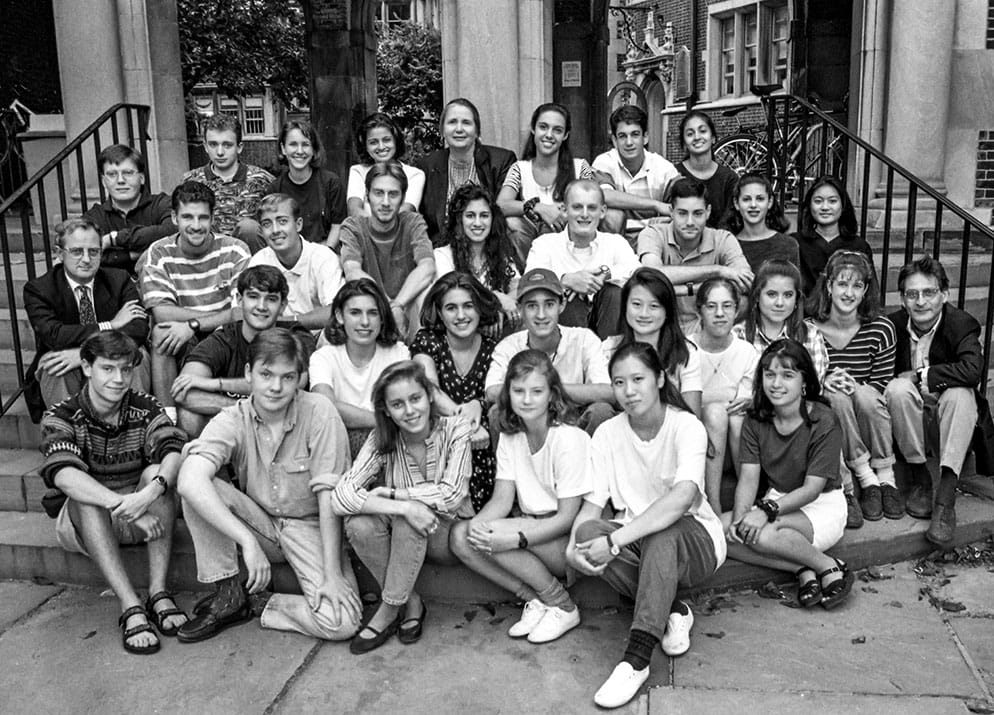The world, Paul Huntsman WG00 believes, needs more risk-takers. It needs bright, educated change-makers who are prepared, he says, “to go down a pathway that is not the normal, conventional pathway.” That is what true leadership is, Huntsman says. And that’s what his father, the late emeritus trustee Jon M. Huntsman W59 HON96, aimed to foster with the groundbreaking undergraduate program he endowed a quarter of a century ago. The global landscape has changed since the debut of the Huntsman Program in International Studies & Business, but the Program’s mission — creating leaders who have the skills, drive, and vision to change the world for the better — is as resonant as ever. After all, Paul Huntsman says, these are students who “were identified at a young age for having the components we need in our global leaders.” It’s his goal — and the goal of the Program — to help them live up to that potential and that responsibility.
It all began in the early 1990s, when the elder Huntsman saw a special opportunity to help create a program that could serve students — and the world — in a new way. Much like the pioneering Lauder Institute that preceded it, the Huntsman Program would offer a small, select cohort of globally minded Penn students rigorous training from two schools: Wharton for business, and the School of Arts & Sciences for languages, social sciences, and liberal arts. Unlike the Lauder Institute, however, Huntsman was designed for undergraduates, who would graduate after four years with a BA in international studies (including a semester abroad) and a BS in economics.
It’s a deeply appealing combination, says Foster Chiang C06 W06 G12 WG12 — particularly for students of the sort he was: someone personally interested in global studies and cultural immersion who also wanted to potentially pursue careers in business. This was also the case with Aditi Kumar C10 W10, who’d lived in New Delhi until she was nine, then moved to Missouri. At 18, she was interested in global affairs and had “vague notions” of an international career, then fell in love with business during the financial crash of 2008, when “Wharton was on the cutting edge of understanding everything that was happening.” Her post-Huntsman career included the World Economic Forum, the U.S. Treasury, and Harvard’s Kennedy School before she landed in her current role as a senior advisor for acquisition & sustainment for the U.S. Department of Defense. Chiang, for his part, went on to work in finance before returning to Wharton to attend the Lauder Institute; today he is the director of TPK Holdings, the family-owned tech giant.
That Huntsman graduates are at home in such different fields is a distinguishing feature of the Program, as is the diversity of their backgrounds. Admission is competitive, notes Harbir Singh, professor of management and Wharton faculty director for the Program: each class is roughly 45 students, “and you have to be admitted by both schools” — and they come from everywhere. “In any given class,” says Kelly Cleary, Huntsman director, “you might have a student from North Philadelphia, a student from Oklahoma, from Palo Alto, from Kenya, Mexico City, Singapore.” And yet, says Chiang, it’s not at all “tribal,” but rather quite the opposite: “You feel a part of the whole world.”
This, too, is part of Jon Huntsman’s forward-thinking vision for the program, which exposes students to countless problem sets around the world — and makes them comfortable with tackling those challenges. “You can literally drop me into any environment,” Kumar says, “and not only will I find it interesting, but I’ll find a way to contribute.”
Published as “The Huntsman Program Turns 25” in the Fall/Winter 2023 issue of Wharton Magazine.

























